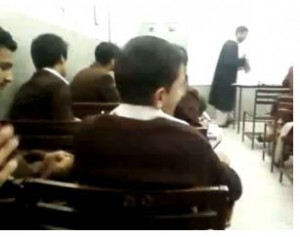A chain of about 100 Azad Schools throughout the erstwhile frontier province and Fata followed. Bacha understood that the Pakhtoons needed to be made fully conscious of the importance of non-violence, education, women’s emancipation, their local culture, history and social traditions, to unite as a proud nation that was also self-sufficient.
For this he devised a curriculum that was designed to develop various skills along with creative and liberal thinking among the Pakhtoon youth of the time. Therefore the curriculum taught at these co-education schools was really a combination of mathematics, science and Islamiyat and several indigenous skills. The teachers were mostly volunteers inculcating a sense of freedom from the British rulers through non-violence and modern education.
In order to create political, literary and social awareness among the Pakhtoons Bacha Khan, in 1928, also launched the first ever Pushto journal Pakhtoon.
So it was to revive the vision of the leader that the Bacha Khan Trust Educational Foundation (BKTEF), a non-partisan body, was registered in 2003 and began work in 2007. The body devised a culture-based curriculum that claims to ensure indigenous skills, techno-creativity fulfilling market requirements and a futuristic vision among the Pakhtoon youth of today.
Both soft and hard skills are encouraged. The soft skills include techniques for effective communication such as reading, writing, speaking, listening and note-taking while the hard skills include drawing, painting, design, print-making, calligraphy and 3-D projects along with other technical and vocational activities such as wood carving, weaving, ceramics, jewelry designing, etc.
To ensure the effective implementation of the culture-based curriculum in BKTEF schools, comprehensive teachers’ training workshops and seminars were carried out in collaboration with Hunerkada, College of Visual and Performing Arts, Islamabad, and the Higher Education Commission (HEC) Peshawar chapter. About 14 such schools are functional in different districts of Khyber Pakhtunkhwa (KP) and Fata where thousands of boys and girls from underprivileged homes receive education. The students are also given uniforms, books and stationery free of cost.
The culture curriculum is a combination of formal and informal education that encourages them to make confident presentations in their respective mother tongues as well as in English. Regular weekly and monthly stage performances, debates and declamation contests along with a variety of other literary and cultural activities are also organised.
BKTEF till now have arranged more than 80 such events at their different schools enabling the pupils to exhibit their particular talents. One BKTEF school in Charsadda recently staged Shakespeare’s Hamlet where the little boys and girls (the schools are coeducation up to class five followed by separate classes for boys and girls) received a standing ovation from the audience for the impressive presentation.
Funds for these schools mostly come from affluent volunteers with some donors also taking care of the educational needs of a particular number of poor students.
Managing Director BKTEF Khadim Hussain informs that his organisation recently singed a MoU with the KP government for mutual cooperation in introducing a culture-based curriculum in public-sector schools along with establishing local Arts and Culture Centres (ACC) in all districts of the province where, in addition to the BKTEF School students, local artistes and artisans would also be trained.
“We have a grand plan for establishing the Bacha Khan Aman (Peace) University somewhere in KP that would give special preference to former BKTEF students after completing their intermediate.”
In line with Bacha Khan’s vision, BKTEF also brings out a Pushto quarterly journal Shataar that highlights the literary, cultural and social issues while another bilingual magazine Mashal, which is in Pushto and English, covers the academic and cultural activities of the schools.
Khadim Hussain further says, “We are free to make any decisions regarding academics, teachers’ and students’ affairs as there is no political interference involved — we are free from any kind of racial, linguistic and ethnic bias.”
The writer teaches English at a public school and college in Peshawar.

